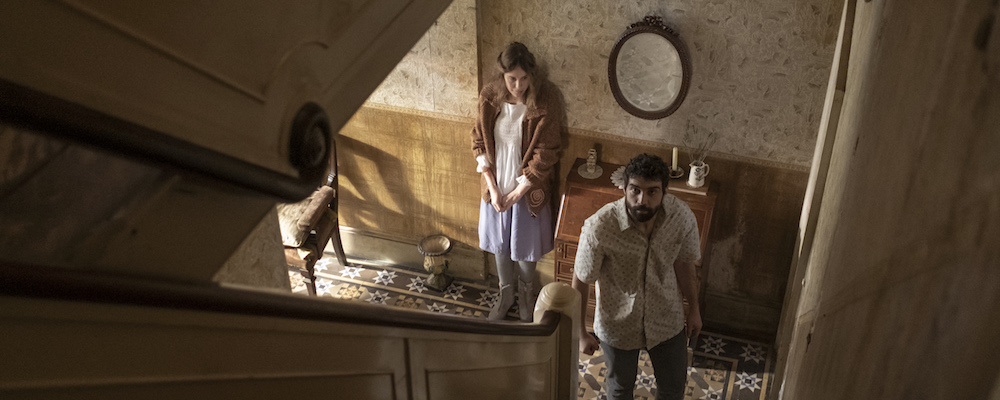Romola Garai Explores Masculinity and the Effects of Warfare in Gripping Directorial Debut ‘Amulet’
Sandra Miska
A refugee finds himself grappling with a variety of demons in the terrifying horror film “Amulet.” Romanian actor Alec Secăreanu stars as Tomaz, a man from an unnamed Central European country who is trying to start over in London. However, after a fire in his homeless shelter lands him in the hospital, Sister Claire (the always marvelous Imelda Staunton), the seemingly kindly nun who found him, finds him a place in a dilapidated old home. He is to help Magda (Carla Juri), a young woman caring for her invalid mother (Anah Ruddin), by fixing up the house in exchange for free rent and homecooked meals. Despite some reluctance on Magda’s part, it doesn’t seem like a bad deal. By the time strange happenings suggest otherwise it is too late, and Tomaz is forced to come to terms with his darker impulses and violent past.
Flashbacks show Tomaz in his prior life during the war, most likely the armed conflict that took place in Bosnia. The connections of his mother, a dentist, secured him a place manning a checkpoint in the wilderness, away from combat. There, the only other human we see him interact with is Miriam (Angeliki Papoulia), a single woman who seeks to cross the nearby border in order to be reunited with her daughter. Around this time Tomaz finds an amulet buried in the ground, which he offers to Miriam for protection. Unfortunately, he turns out to be the one she needs to be protected from.
“Amulet” is the feature directorial debut of Romola Garai, a British actor who is best known for her roles in period films such as “Atonement” and “Vanity Fair.” Garai, who also wrote the screenplay, spoke at length about the film and her creative process with Entertainment Voice. She was inspired to tell this particular story after reading about warfare.
“I’d been absorbing material that made me think more generally about how people move on from their past, and also the kind of psychological flitting that might occur, I think, particularly, with men around the issue of their own heroism, or the status of their heroism. It’s extremely psychologically threatening to have that idea of yourself as a protector taken away, when, in truth, violence, even when meted out in a righteous cause, is still violence,” she said.
For Garai, it was important to her that the audience sympathize with Tomaz before the full extent of his past transgressions are uncovered, leading her to create a complex, intriguing character. Under her direction, Secăreanu delivers an impressive performance as Tomaz comes to a state of reckoning.
There’s no doubt that Tomaz is a tormented man, and Garai wisely thought it best to show this, rather than having him vocalize his feelings. Early on, we see him bind his hands together with tape to prevent him from harming himself during his sleep. However, Garai purposely avoided labeling Tomaz with a specific psychological condition, as she did not want him to be an object of pity. “I’m just sort of interested in that one aspect of masculinity, and why it is that men need to be good and thought of as good all the time. In my experience of being a woman, you walk around all the time thinking that you’re a piece of shit (laughs), and you’ve failed, where I think the reverse is true for men. It’s very threatening to come to terms with yourself and your failures and weaknesses.”
There’s no one Tomaz wishes to convince, other than himself, that he’s one of the good guys more than Magda. Like him, she has experienced trauma, and it soon becomes evident that her mother is abusing her. Slowly, the two become closer, but a malevolent force comes between them.
The evil in the house partly manifests as terrifying, bloody winged creatures that appear in the most inconvenient of places. “I think in the script, it literally just said, ‘this is a combination of a bat and a rat and it’s your worst nightmare,’” revealed Garai when asked about the conception of these creatures. She worked closely with a concept artist to bring to life what is best described as “nightmare fuel.”
Then there’s the amulet itself, which comes to play an important role in the fever dream of a final act, coming to life as a living, female being. Garai revealed which other film featuring religious symbolism inspired her. “One of the films that had a big impact on me when I was younger was ‘Pan’s Labyrinth.’ It’s about war and somebody coming to terms with war, but it’s also about mythology and fairy tale, so maybe that was woven into this film because I had this idea really, really early on that there was this avenging female force in the world, and what would happen if this avenging female force was let loose on somebody who committed a [violent] crime?”
In the end, Garai found making her first film to be a cathartic experience, and she got a lot out of creating characters who defy stereotypes, such as Sister Claire, the bride of Christ who is eventually revealed to have nefarious plans where Tomaz is concerned. According to the director, she didn’t originally set out to create a villain out of an outwardly religious woman, but wisely came to the conclusion that this was the best choice she could make. “I think there was a draft where she wasn’t a nun, but it just wasn’t nearly as scary.”
“Amulet” releases July 24 on VOD.

